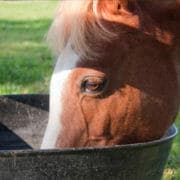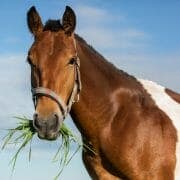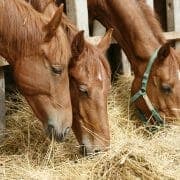Gastric Ulcer Medication for Horses and Their Effect on Digestion
Question: Does gastric ulcer medication reduce nutrient digestion in horses?
Answer: Yes
Research shows that starch from grains that were exposed to equine stomach fluid before being digested by small intestinal enzymes was between 17% (extruded rice) and 104% (cracked triticale) more digested than starch that wasn’t exposed to the stomach fluid.
While the research can’t say how much of this increased starch digestion was due to the stomach acid and how much was due to the protein digesting enzymes that are present in the stomach fluid, the stomach fluid was having a definite positive influence on the digestion of starch.
It’s important to remember that the protein digesting enzymes in a horse’s stomach fluid rely on the stomach acid to activate them, so regardless of whether the improved digestion was due to the avid itself or the protein digesting enzymes, if you stop acid production using ulcer medications you will lose both the acid and the enzymes.
If you use gastric ulcer medications for horses like ranitidine and omneprazole to reduce gastric acid secretion, you are very likely reducing the digestion of at least some nutrients further down the gastrointestinal tract.
What should you do about this?
If your horse has ulcers, treating and getting rid of the ulcers as quickly and effectively as possible is by far the most important consideration. However, once the ulcers are gone, it is recommended to use good management practices to keep your horses chewing, their stomachs full and buffered with saliva, and their minds calm instead of constantly using medication to prevent ulcers. This way allows their gastrointestinal tract to function the way it was designed and allows the digestion process to be as effective as possible.
For more info on feeding to prevent ulcers, read our article ‘Avoiding Gastric Ulcers’ here.
Join FeedXL today and take control of your horse’s nutrition
Get EVEN MORE practical and personalised feeding guidance when you sign up to FEEDXL.
Do you have a question or comment? Do you need help with feeding?
We would love to welcome you to our FeedXL Horse Nutrition Facebook Group. Ask questions and have them answered by PhD and Masters qualified equine nutritionists and spend time with like-minded horse owners. It’s free!
Click here to join the FeedXL Horse Nutrition Facebook Group











